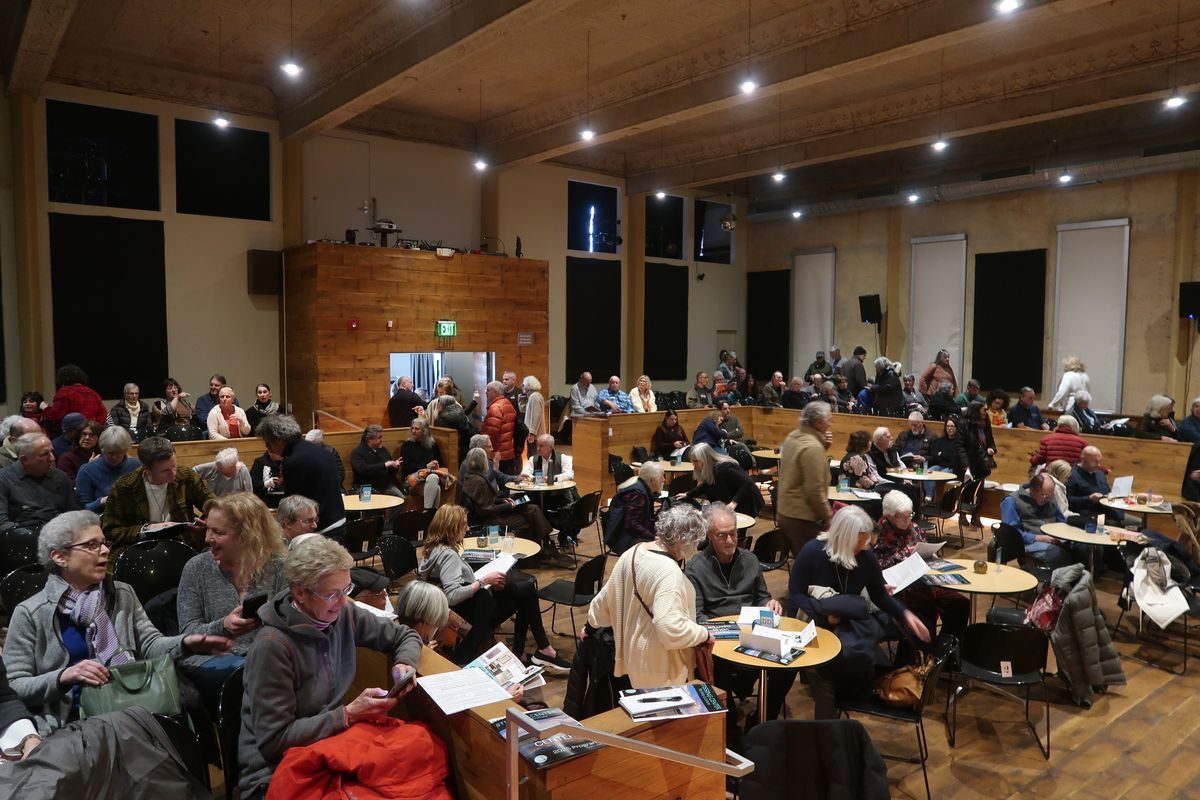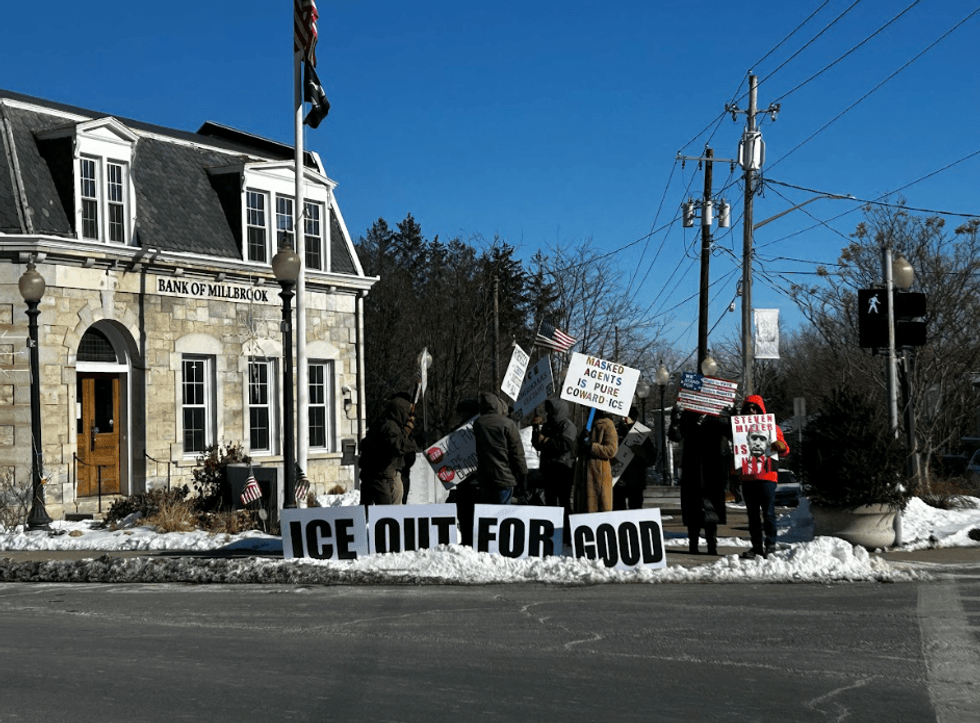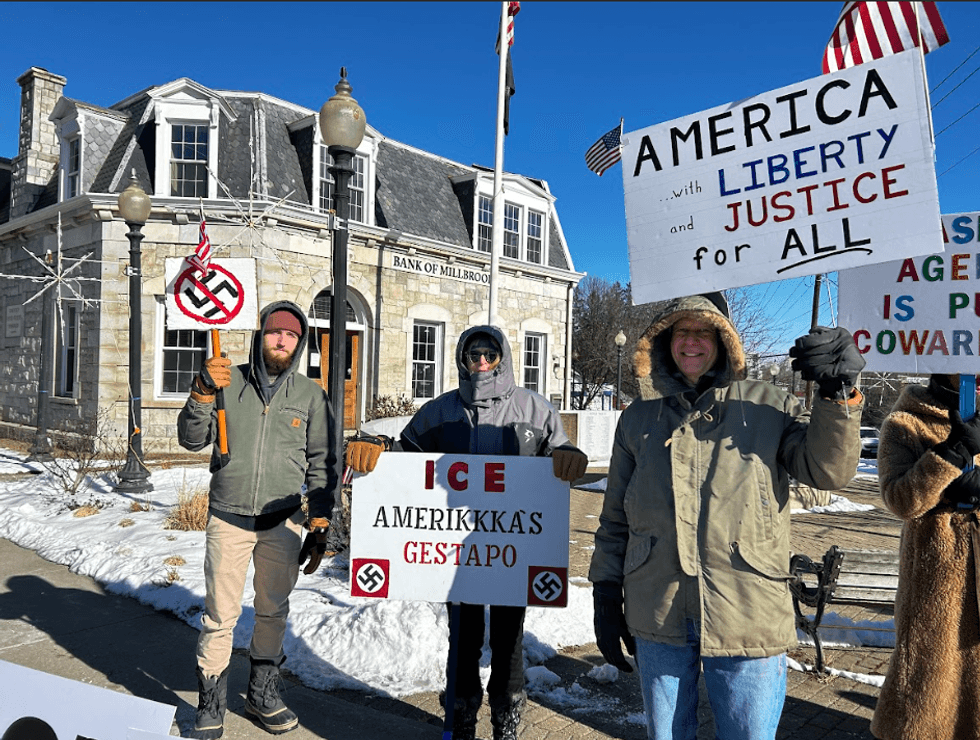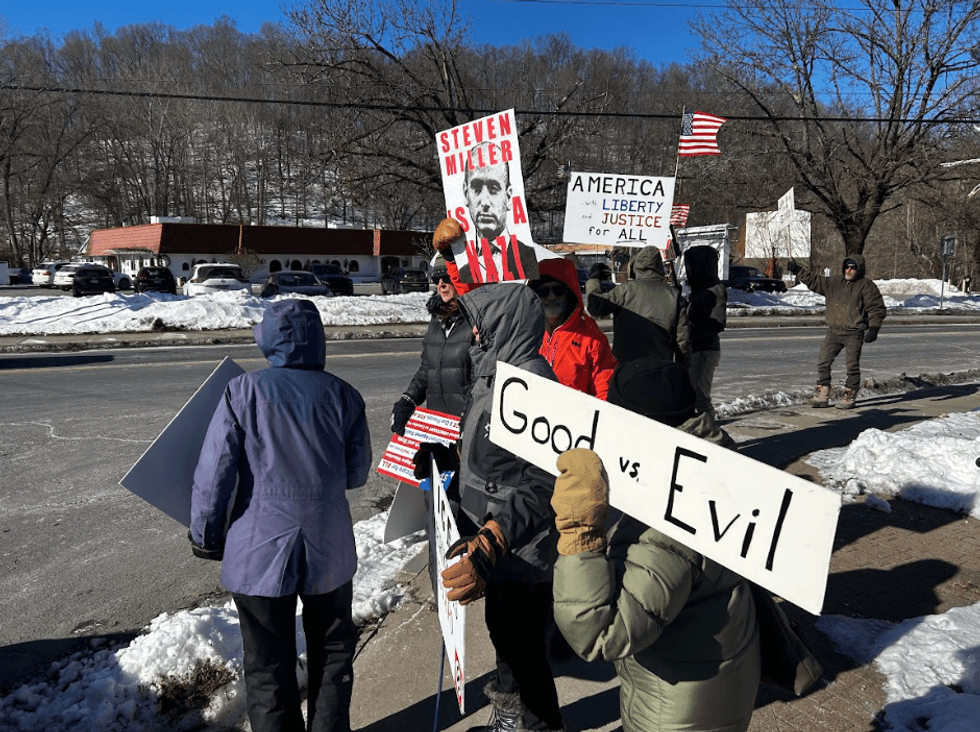‘Selected Shorts’ comes to Stissing Center

The Stissing Center was bustling just before the show on Sunday, March 9.
Photo by Alec Linden

The Stissing Center was bustling just before the show on Sunday, March 9.
PINE PLAINS — The Stissing Center was packed on Sunday for an afternoon performance of podcast and NPR series “Selected Shorts.” The sold-out show, which was recorded for national broadcast at a later date, brought a lineup of four accomplished actors and storytellers to the Pine Plains stage to recite a selection of short stories from award-winning authors.
“Selected Shorts,” a product of Manhattan-based performing arts powerhouse Symphony Space, features prominent actors who recite works of short fiction. The full program usually revolves around a theme; Sunday afternoon’s focus was “transformations.”
Comedian, writer and actress Ophira Eisenberg — or “renaissance woman of storytelling,” as Stissing Center Executive Director Patrick Trettenero introduced her — assumed hosting duties, warming up the crowd with jokes about Brooklyn egg prices and doctors with self-esteem issues — “I want a megalomaniac with a god complex and no hobbies.”
Every seat in the large coffeehouse-style auditorium was filled, and the crowd was engaged. “For a 3 p.m. audience, you guys are amazing!” exclaimed Eisenberg.
Actor David Straithairn took the stage first, reading a short story by Pulitzer Prize winning author Steven Millhauser titled “Green.” Straithairn’s classic, almost antique delivery suited the small-town American ethos of the story well. A somewhat detached but observant narrator recounts the story of a sort of anti-plant mania that started “innocently enough” in his town, stripping public and private property alike of all greenery. Eventually, a few intrepid neighbors add shrubbery back to their yards, prompting a swing back in the other direction: “After a brief diversion, a playful experiment, things had returned to normal in our quiet town — or had they?”
Straithharn’s reading was followed by an animated performance from actor Lauren Ambrose, whose long resumé is most recently punctuated by her role in the popular television series “Yellowjackets.” Ambrose read “Quantum Voicemail” by novelist and short-story writer Kristen Iskandrian, a woozy tale from a particular and slightly neurotic narrator who describes voicemail in probably the most poetic language ever put to page about the messaging format. Voicemail is “a stirring three minute soliloquy,” and “like a photograph, it capture[s] a moment of attention,” says the rapt narrator.
A brief intermission enabled patrons to refuel with drinks or popcorn from the bar, or head outside to enjoy the early spring weather. For those who remained in the theater, the sunken lounge-like space in the center of the room facilitated easy conservation between neighbors as they reflected on the performances.
Eisenberg herself recited the third story, “Squirrels” by Israeli writer Etgar Kenet. The action opens with a description of a family myth — or was it? — about a grandfather being reincarnated as a giant squirrel after a battle with cancer, and which subsequently halts his widow’s next wedding by biting the groom-to-be’s thumb. The story does get sentimental, which Eisenberg’s mostly comic oration accented well.
The final performance was of New York City-raised writer Jamel Brinkley’s “Blessed Deliverance,” a coming-of-age story about a group of college-bound teenagers growing up and growing apart in gentrifying Brooklyn. New York stage and screen actor Teagle F. Bougere handled the tension and confusion of late childhood/young adulthood well in his recitation. The plot reaches a high point when an unhoused man releases a pack of rabbits from an animal rescue shelter into the street while the group of teens looks on, cheering but not entirely sure what for.
After a few closing remarks from Eisenberg, the show was complete. Satisfied attendees made their way back to their cars and released the streets of Pine Plains into Sunday quietude once again.
Snow covered Route 44/22 near the Maplebrook School campus in Amenia at 10:30 a.m. Sunday, Jan. 25.
Dutchess County officials issued a travel ban on all public roads from 5 a.m. Sunday, Jan. 25, to 5 p.m. Monday, Jan. 26.
The National Weather Service issued a Winter Storm Warning for much of upstate New York on Friday. Forecasts call for between 10 and 20 inches of snow across northeast Dutchess County.
Road crews across the region told The News that they are feeling prepared.
Visits to North East, Amenia, Washington, Stanford and Pine Plains revealed the salt is in good supply and the equipment is in good working order ahead of the storm.
Stanford Highway Superintendent Jim Myers and his crew were strapping plows to a truck in the town garage on Friday morning, Jan. 23. He said the Stanford road crew was as prepared as it can be, echoing a common sentiment among crews in the region.
"You just got to stay on top of it," Myers said. "Keep going."
County Executive Sue Serino said in a post on FaceBook that all non-emergency and non-essential travel is forbidden until 5 p.m. Monday. Only emergency personnel, road crew members, employees deemed essential for facility operation and news media covering the storm are permitted to travel during the ban.
All others are required to stay home. Pine Plains Highway Superintendent Carl Baden said that's the safest course of action during the storm.
"Just stay home," he said. "We can make it a lot safer for you if you wait."
Protesters gather during a weekly anti-Trump demonstration in Fountain Square in Amenia on Saturday, Jan. 24, holding signs opposing Immigration and Customs Enforcement.
AMENIA – A group of protesters braved 9-degree temperatures for their weekly anti-Trump demonstration in Fountain Square on Saturday, Jan. 24, as news broke of another alleged fatal shooting of a U.S. citizen in Minnesota involving federal agents – developments that organizers said reflected the urgency of their message.
The group, which described itself as “small but mighty,” drew seven people who stood along the road holding signs expressing opposition to Immigration and Customs Enforcement (ICE), including slogans likening the agency to Nazis and messages in support of immigrants.
Protest organizer Kimberley Travis, who began the regular demonstrations last June with signs bearing the anti-Trump slogan “No Kings,” has remained among the fluctuating number of protesters each week.
Travis said her garage is full of handmade signs – a reflection of the rapidly-changing news cycle and her need to keep up with current events. On Saturday, many of the signs focused on what protesters described as the increasingly extreme actions associated with ICE.
Large, simple signs planted in the snow read, “ICE Out for Good,” a phrase inspired, Travis said, by the recent killing of a Minneapolis mother by a federal agent.

“We're here today – and every Saturday – because we’re tired of what's happening to our democracy,” Travis said, who believes that the Constitution is being “demolished on a daily basis.”
Gesturing toward the other protesters, Travis said, “We, the people, must stand for our democracy, our constitutional freedoms, and we need to stop the murder in the streets and the kidnapping.”
Millerton resident Greg Swinehart said he has attended the Fountain Square protests between eight and 10 times, motivated by what he described as the growing militarization of the country and the violence committed by ICE.
“We need to resist that in a peaceful, nonviolent way,” Swinehart said. “We’re trying to raise awareness in our local community by helping people see messages they might encounter in the national media through the voices of their own friends and neighbors.”
While most passing drivers either honked and waved in support – or simply drove past – a few showed disapproval. One man slowed his vehicle to hurl a string of expletives at the protesters, telling the group to go home.
Still, neither the occasional hostility nor the bitterly cold weather deterred the group, which gathers each Saturday from noon to 1 p.m. “Every car honk feels like another drop of hope,” one demonstrator said.

When asked if they were afraid to protest so publicly after reports of lethal shootings in Minnesota, the residents generally shared the same response.
“I probably should be,” Travis said. “But they will not intimidate me, and they will not stop me.”
Since beginning the protests last summer, Travis said she has experienced threats and intimidation and has, on one occasion, had to call the police. Even so, she said the encouragement she receives far outweighs the hostility.
A longtime activist, Travis said she has been protesting for causes she believes in since she was a young teenager during the Vietnam War and doesn’t plan on stopping anytime soon.
Swinehart said he has not felt threatened and hopes the gatherings will continue to grow.
“I hope that more citizens join us,” he said. “I hope more people will speak out for what they think is right, and to enjoy the camaraderie of standing alongside people who care deeply about America.”

Mark Dedaj, 34, pleaded guilty in Dutchess County Court to first-degree manslaughter in connection with the 2021 death of his sister at a Millbrook residence.
MILLBROOK — A Millbrook man has pleaded guilty to first-degree manslaughter in connection with the 2021 killing of his teenage sister inside their family home, Dutchess County District Attorney Anthony Parisi announced Thursday.
Mark Dedaj, 34, pleaded guilty in Dutchess County Court to a Class B felony, admitting that he caused the death of his 17-year-old sister, Maureen Nelson-Lanzi, by holding her face down into a pillow on a bed until she suffocated.
The incident occurred on Sept. 4, 2021, at their residence on Harts Village Road.
“This was a brutal and heartbreaking act of violence within a family,” Parisi said in a statement. “Our office made the deliberate decision to take action, because the loss of this victim’s life demanded accountability. This plea holds the defendant responsible for his actions, ensures a measure of justice, and spares the victim’s loved ones the pain of reliving this tragedy through a trial.”
Dedaj is scheduled to be sentenced on March 26, 2026. Under the terms of the plea agreement, he will receive 25 years in state prison followed by five years of post-release supervision.
Members of the North East Town Board discuss proposed zoning code revisions during a meeting at North East Town Hall in Millerton on Monday, Jan. 19.
MILLERTON — The North East Town Board on Monday, Jan. 19, adopted a series of detailed revisions to its proposed zoning code overhaul, incorporating feedback from county and local agencies as well as public comments.
Zoning Review Commission Chair Edie Greenwood and the town’s zoning consultant, Will Agresta, participated in the meeting as board members reviewed comments submitted by Dutchess County Planning, the North East Planning Board, the town’s Conservation Advisory Council, and residents who spoke or submitted written remarks during the initial public hearing on Jan. 8.
Board members addressed the comments line by line, approving changes that Greenwood described as largely technical in nature, including revisions to definitions that did not align with state regulations and clarifications intended to improve readability and consistency.
Greenwood said a red-line draft showing the approved changes alongside the original text will be prepared.
Among the more substantive revisions was the decision to impose an overall size cap on accessory dwelling units. The board voted to limit ADUs to a maximum of 1,200 square feet and specified that they must be accessed from an existing driveway on the property. Board members also discussed adding language to clarify how ownership through an LLC or trust would comply with the requirement that the property owner reside in the principal dwelling.
The board also approved allowing retail businesses and restaurants in the so-called Irondale District, a small commercial area encompassing seven parcels along Route 22 near Winchell Mountain Road and Irondale Road.
Other changes included:
– Replacing the term “farm” with “farm operation” for consistency with state law.
— Revising drive-through regulations to allow additional lanes for banks.
— Tying requirements for landscaped islands in parking lots to the size of the lot.
— Adding expiration dates for site plan approvals.
— Removing references to “cage-type poultry farms.”
— Requiring 10% of parking spaces in lots with 30 or more spaces to be “EV-ready,” meaning the necessary infrastructure must be installed, but not necessarily a charger itself.
— Standardizing safety and maintenance requirements across all parking regulations.
— Clarifying that parking structures may be built above or below grade.
— Allowing farm machinery sales and rentals.
Greenwood told The News she expects the red-line draft to be completed and submitted before the end of next week. The Town Board is set to continue the public hearing on the proposed zoning changes on Tuesday, Feb. 3, at 7 p.m. at North East Town Hall.